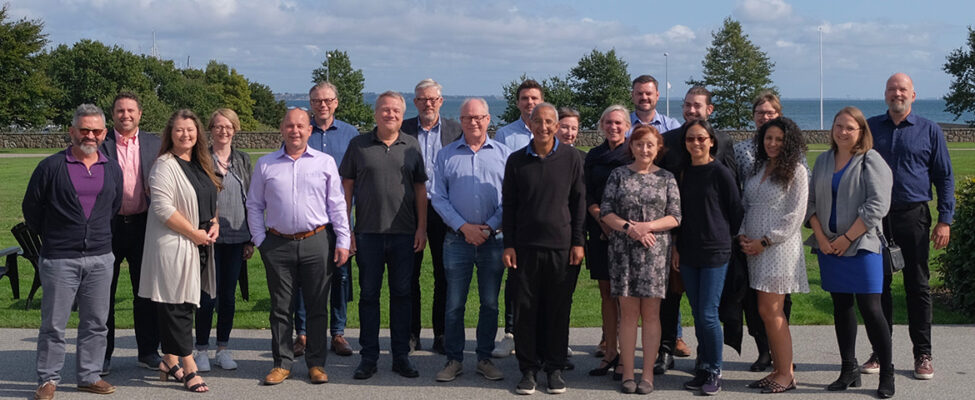Galecto BioTech – Case Study

Galecto Biotech develops small molecules for the treatment of severe diseases. The company, founded in 2011, builds on more than 10 years of research and the use of galectin modulators to treat fibrosis-related diseases and cancer.
Dr Alison MacKinnon, Director of Research, tells us that much of her initial research was conducted at the University of Edinburgh’s Centre for Inflammation Research and led to the creation of Galecto BioTech with facilities on BioQuarter to direct preclinical activities.
What has been your career path?
I am a pharmacologist by training and received my PhD in Pharmacology at the University of Edinburgh in 1993 whilst working as a researcher for Syntex Pharmaceuticals. I then spent several years in academia initially as a postdoctoral scientist in Professor Tariq Sethi’s lab and subsequently as a principal investigator at the University of Edinburgh Centre for Inflammation Reseach (CIR) at the Queen’s Medical Research Institute.
My research focus has been on processes that regulate chronic inflammation and tissue fibrosis, with particular interest in the role of galectins in the disease process. This research led to the creation of Galecto Biotech, and as Director of Research my role is in the preclinical development of novel inhibitors and to research potential new indications for our molecules.
Tell us about some of your career highlights…
In 2009, I set up a collaboration with investigators in Lund University who were characterising novel galectin-3 inhibitors. This collaboration led to the identification of novel high affinity inhibitors of galectin-3 and findings were published in the American Journal of Respiratory and Clinical Care Medicine. The work from this article lead to the creation of Galecto Biotech in 2011.
The compound tested in these original preclinical studies is GB0139 which is now in Phase 2b clinical development for idiopathic pulmonary fibrosis (IPF) in the GALACTIC-1 study (NCT03832946), a large multi-centre, randomized, double blind placebo controlled study of 450 patients with IPF. It has been my greatest achievement to see my original research be translated into a potential novel therapy for IPF.
The story behind Galecto BioTech…
Founded in 2011 by leading galectin scientists and biotech executives from Denmark (Dr. Hans Schambye), Sweden (Professors Ulf Nilsson and Hakon Leffler) and the UK (Professor Tariq Sethi), the company today is incorporated in the U.S., and has its operating headquarters in Copenhagen, Denmark.
Galecto Inc. now has over 25 employees working from offices in London, Edinburgh, Gothenburg, Montreal and Boston, so is truly a global company.
Galecto builds on more than 10 years of research centering on the role of galectin-3 and the use of modulators of these proteins to treat fibrosis-related diseases and cancer. Combined with a strong patent estate, these assets give Galecto a unique therapeutic platform.
In addition to the lead product candidate, GB0139, the company’s portfolio also includes GB1211, an orally bioavailable galectin-3 inhibitor, for the treatment of systemic fibrotic diseases, including fibrosis related to non-alcoholic steatohepatitis, or NASH; and GB2064, an inhibitor of lysyl oxidase like 2, or LOXL2, an enzyme directly involved in formation of fibrosis.
The company is funded by a strong list of well known investment companies and venture capital including Novo, Sunstone and Orbimed among others.
Why did you Galecto choose to locate on BioQuarter?
Much of the initial research and development around galectin-3 and its inhibitors was conducted at CIR so it was natural to acquire office space on BioQuarter in which to direct preclinical activities.
Some early stage research work is still conducted at the CIR as Galecto has a fully funded postdoctoral research assistant, Dr. Ross Mills, who is working on galectin related projects.
The interaction between academia and industry is crucial for effective translational research and our company has its foundation on this open and active collaborative approach.
What collaboration opportunities or engagement have you gained from across BioQuarter?
Galecto is co-sponsor on several other academic and translational projects on BioQuarter at the CIR and Royal Infirmary of Edinburgh (RIE). I am also co-supervisor on a number of postgraduate projects.
I also have academic collaborations with groups in the Centre for Regenerative Medicine and the Roslin Institute, and in early stages of engagement with Fios Genomics, also with facilities at NINE, and hope to collaborate further with the research community on BioQuarter.
Galecto is part of the DEFINE COVID-19 initiative which aims to test promising new therapies in small numbers of COVID-19 patients. GB0139 is one of the trial compounds in this study which will be compared against standard care in patients who are experiencing different symptoms of COVID-19.
What are the plans for the future?
When I first started my academic career at University of Edinburgh with Professor Sethi our research focused on lung cancer and how the microenvironment around tumours can impact tumour growth.
Galectins are important modulators of the tissue microenvironment in several tumour types. Developing Galecto’s inhibitors for an oncology indication will be a new and exciting avenue for the future.
What do you enjoy most about BioLife?
I’m from Edinburgh so the location is perfect for me as I can cycle to work and it make it easier to keep up with colleagues past and present.
The coronavirus outbreak has limited personal interaction, however Zoom and Teams have allowed communication to remain open although nothing really beats human interaction and informal discussions over coffee.



